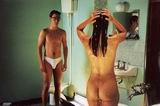
East of the West 2002 / Kraljica noći / Croatia 2001
Summer 1968. The Croatian town of Osijek on the river Drava is completely unaware of events shaking the world and, indeed, the rest of Yugoslavia. A “Welcome Tito Rowing Competition” is being organised which is to be inaugurated by the man himself. Seventeen-year-old Tomo, a great athletic talent, is expected to become the winning hero. But the event becomes his first tough test in life.

Summer 1968. The Croatian town of Osijek on the river Drava is completely unaware of events shaking the world and, indeed, the rest of Yugoslavia. A “Welcome Tito Rowing Competition” is being organised which is to be inaugurated by the man himself. Seventeen-year-old Tomo is expected to become a hero as Osijek’s best rower and all-around athlete. The rather shy boy spends all his time training, especially since he’s none too successful with the girls. But no one knows that he suffers from serious health problems, something he’s long been hiding, even from his doctors. Tomo ends up in the hospital after a sudden attack, and his participation in the race is seriously threatened. Local organisers, Party officials above all, are willing to use every means at their disposal to get the young man into his skiff so he can win. They plead with the doctors and health workers, but mainly with the unhappy Tomo himself. The situation becomes unbearable when they arrest his father before his very eyes on suspicion of political disloyalty. On the day in question Marshal Tito’s Blue Train approaches Osijek, but it merely passes through. All those who have come to meet the train catch the barest glimpse of the sleeve of his uniform and his white-gloved hand waving from the window.
96 min / Black & white, 35 mm
Director Branko Schmidt
/ Screenplay Josip Cvenić
/ Dir. of Photography Silvije Jesenković
/ Music Ante Mažuran
/ Editor Vesna Lažeta
/ Producer Vesna Mort
/ Production HRT Croatian Radio and Television
/ Cast Luka Dragić, Barbara Vicković, Mustafa Nadarević

Branko Schmidt (b. 1957, Osijek, Yugoslavia) first studied economics, but gave it up upon being accepted to Zagreb’s Academy of Dramatic Arts where he graduated in film and television direction. His thesis was the exceptional television production The Early Adolescence of Marek Kovać (1981, Rano sazrijevanje Marka Kovača), and Hildegard (1982) was voted best TV production of the year. He based his first feature, Falcon Didn’t Like Him (1988, Sokolga nije volio), on the novel of the same name by Fabijan Šovagović. Other films include Evil Blood (1991, Djuka Begović), Vukovar: The Way Home (1994, Vokovar se vraća kući), Christmas in Vienna (1997, Božić u Beču) and Hearts Are Not in Fashion (2000, Srce nije u modi).
First-hand brews throughout the year.
Be among the first to learn about upcoming events and other news. We only send the newsletter when we have something to say.